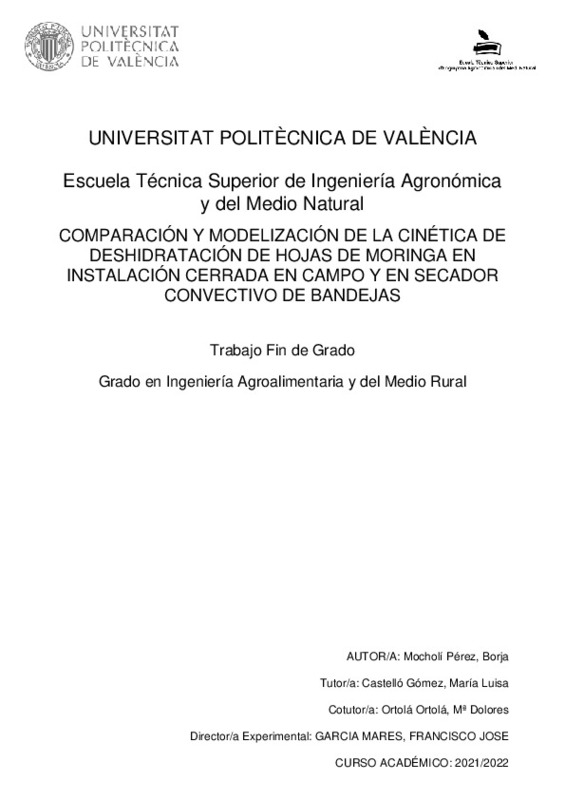|
Resumen:
|
[ES] El cambio climático implica recurrir a cultivos menos exigentes en aporte hídrico y más tolerantes con las altas temperaturas. En este sentido, la adaptación de la Moringa oleifera a la cuenca mediterránea española ...[+]
[ES] El cambio climático implica recurrir a cultivos menos exigentes en aporte hídrico y más tolerantes con las altas temperaturas. En este sentido, la adaptación de la Moringa oleifera a la cuenca mediterránea española supone una alternativa a la producción vegetal sostenible a la vez que ofrece productos derivados de diferentes partes de la planta altamente nutritivos. Además, en otras zonas geográficas menos desarrolladas y con clima tropical podría suponer una alternativa de cultivo con elevadas posibilidades económicas. No obstante, en ambos casos, la estabilización de las hojas se requiere para poder abastecer el mercado de producto de forma uniforme. Por ello, este Trabajo fin de grado tiene como objetivo diseñar un secador modular, económico y escalable, que permita deshidratar las hojas en el mismo campo con la consiguiente reducción de los costes de producción, y modelice la cinética de secado comparándola con la obtenida en un secador de bandejas semiindustrial. Asimismo, se han comparado las características fisicoquímicas de las hojas de moringa deshidratadas en ambos secadores que procedían de plantaciones con distintas edades (1 y 4 años). Los resultados ponen de manifiesto la viabilidad del secador de campo diseñado. La cinética de secado en ambos equipos se ajustó mejor al modelo Logarítmico. Aunque la humedad de equilibrio alcanzada es algo superior a la obtenida en el secador de bandejas por la variabilidad en las condiciones del aire en campo, el producto fue similar en términos de capacidad antioxidante, contenido proteico y color. Las hojas de plantaciones más jóvenes presentaron mayor capacidad antioxidante y alcanzaron un menor contenido en humedad final.
[-]
[EN] Climate change implies resorting to crops that are less demanding in terms of water supply and more tolerant of high temperatures. In this regard, the adaptation of Moringa oleifera to the Spanish Mediterranean basin ...[+]
[EN] Climate change implies resorting to crops that are less demanding in terms of water supply and more tolerant of high temperatures. In this regard, the adaptation of Moringa oleifera to the Spanish Mediterranean basin represents an alternative to sustainable plant production, offering highly nutritious products derived from different parts of the plant. Furthermore, in other less developed geographical areas with tropical climates, it could represent an alternative crop with high economic potential. However, in both cases, stabilisation of the leaves is required in order to supply the market with a uniform product. Therefore, the objective of this Final Degree Project is to design a modular, economical and scalable dryer that allows the leaves to be dehydrated in the same field with the consequent reduction of production costs, modelling the drying kinetics and comparing it with those obtained in a semi-industrial tray dryer. The physicochemical characteristics of the moringa leaves dried in both dryers from plantations of different ages (1 and 4 years old) were also compared. The results show the feasibility of the field dryer designed. The drying kinetics in both dryers were better adjusted to the Logarithmic model. Although the equilibrium moisture reached is somewhat higher than that obtained in the tray dryer due to the variability of air conditions in the field, the product was similar in terms of antioxidant capacity, protein content and colour. Leaves from younger plantations had a higher antioxidant capacity and reached a lower final moisture content.
[-]
|







